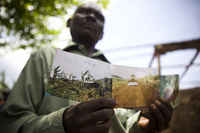GRAIN releases data set with over 400 global land grabs
Today GRAIN is making available a new data set documenting 416 recent, large-scale land grabs by foreign investors for the production of food crops. The cases cover nearly 35 million hectares of land in 66 countries.
The data set is available in HTML below and in XLS
and PDF
formats
This is not an exhaustive list of all land deals. It focuses only on those deals that:
- were initiated after 2006,
- have not been cancelled,
- are led by foreign investors,
- are for the production of food crops, and
- involve large areas of land.
Deals for sugar cane and palm oil production were included but not those for crops like jatropha or cotton.
The collection of deals provides a stark snapshot of how agribusiness has been rapidly expanding across the globe since the food and financial crises of 2008 and how this is taking food production out of the hands of farmers and local communities.
It confirms that Africa is the primary target of the land grabs, but it also underlines the importance of Latin America, Asia and Eastern Europe, demonstrating that this is a global phenomenon.
Other recently released data sets from GRAIN on land grabbing
Extent of farmland grabbing for food production by foreign interests: How much agricultural land has been sold or leased off? (December 2011). A table showing the percentage of the area grabbed by foreigners -- for the production of crops and livestock -- in terms of arable land, agricultural land and total land area per country.
Pension funds investing in global farmland for food production (updated December 2011). A table that shows which pensions funds are buying up farmland, where they are buying it and how much they are spending.
Land grabbing and the global food crisis - presentation (December 2011). A powerpoint presentation providing a general overview of the land grab trend, which includes maps and summaries of land grab cases.
The data set also paints a clear picture of who the land grabbers are. While most of the 298 land grabbers documented are from the agribusiness sector, financial companies and sovereign wealth funds are responsible for about a third of the deals. And on many occasions there is overlap. For instance, the data set shows how Cargill, one of the world's largest agribusiness companies, has been acquiring hundreds of thousands of hectares of farmland through its hedge fund Black River Asset Management.
European and Asian based investors account for about two thirds of the land grabs within the data set. China and India are major sources of land grabbers, as are the UK and Germany. But the UK, much like Singapore and Mauritius, serves as a tax haven for land grabbers, and often the true operating bases of the companies reside elsewhere. Other major centres of land grabbers are the US, which tops the list at 41 cases, and the UAE and Saudi Arabia with 39 combined.
This table is based on data available to us, most of it collected from the website farmlandgrab.org. It has not been verified against realities on the ground. It is also a summary, and as such doesn't capture all nuances and details. Sources are available on request.
The data set is available in HTML below and in XLS
and PDF
formats
French and Spanish versions will be available shortly.
For further information, please contact:
Devlin Kuyek in Montreal, Canada
devlin@grain.org
+1 514 571 7702
Renée Vellvé in Paris, France
renee@grain.org
+33 6 75073468
Carlos Vicente in Marcos Paz, Argentina
carlos@grain.org
+549 11 63088809

